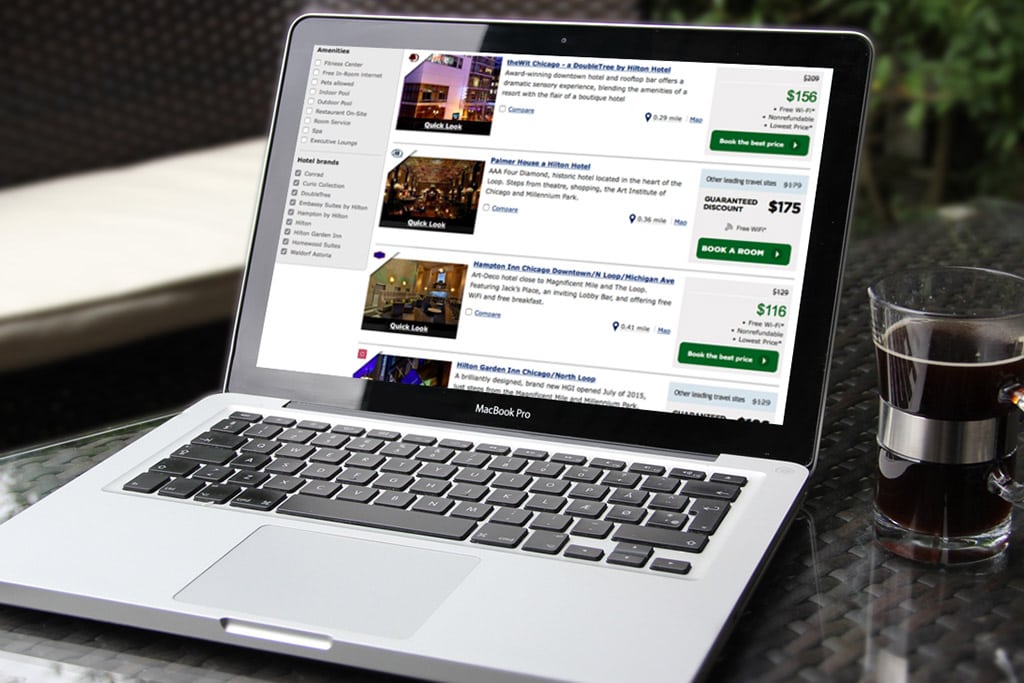Skift Take
Expedia, Booking.com and Ctrip are all slated to grow at at healthy clip over the next few years despite moves by big chains to steal some market share. If Morningstar's numbers are right, then some of the chains may find that the potential advantages of their direct-booking campaigns may not be as large as they once imagined.
Hilton and Marriott’s substantial advertising campaigns to entice direct bookings on their websites and to steal share from online travel agencies does not mean the sky is falling for sites such as Expedia, Booking.com and Ctrip, according to a new study.
A Morningstar research report characterizes the risk to the online travel agencies from major chains’ direct-booking campaigns as “overblown,” and forecasts that they will produce a 1 percentage point headwind for the Priceline Group (compared with Morningstar’s mid-teen percent annual booking growth estimate for Priceline through 2020); a 1.5 percentage point headwind for Expedia (in conjunction with a low-teen percent annual booking growth forecast through 2020), and a 0.5 percentage point headwind for Ctrip (which is forecast to grow bookings at an annual mid-30 percent clip through 2020).
Why would the impact to the online travel agencies be so negligible?
Morningstar points to “Priceline and Expedia’s network, marketing, and technology scale; the cost that sustained discounting of rooms has on hotel financials and brand (key sources of moats in the lodging industry); the Priceline and Expedia’s ability to participate in direct bookings of hoteliers; and the higher fragmentation of hotels relative to airlines.”
On the latter point, Morningstar estimates that American, Delta, United and Southwest command about a 75 percent share of U.S. online flight bookings while the hotel-direct website share in the U.S. is only about 50 percent. And the online travel agencies likely have a higher percentage share of online hotel bookings in Europe, where the hotel market is much more fragmented than in the U.S.
The equity research firm argues that online travel agencies are responsible for 10-15 percent of all hotel bookings worldwide and that their “network advantages have reached critical mass.”
For example, while Marriott-Starwood, which completed their merger late last month, can now boast of 1.2 million rooms, Booking.com alone among the online travel agencies offers 23.7 million rooms, including hotels and alternative accommodations, Morningstar states.
“This supply drives strong visitor use,” states the report, which is called “Book Shares of Priceline and Expedia: Hotel Direct Risk Overblown.”
Hotels would risk losing market share to competitors if they too severely downgraded the online travel agency channel, the report states, noting that Expedia pointed to independent hotels taking share on Expedia sites from chains during the second quarter as Expedia dimmed chains’ displays in response to their direct-booking push.
Is the Direct-Booking Push Sustainable?
Morningstar posits that “hotel operators will be rational in their pricing strategies.”
Among InterContinental, Marriott-Starwood, Hilton, Wyndham, Accor and Hyatt (which are the brands that Morningstar covers), Morningstar estimates they would attract 71.2 million incremental direct bookings in 2016 versus 2015 because of their campaigns and resulting lower loyalty-member rates.
If their average discount is 10 percent and assuming they don’t get incremental volume other than the volume they divert from online travel agency and offline channels, “this would result in around $65 million of lost EBITDA in total for our hotel coverage, offsetting the $135 million in combined OTA commission savings,” Morningstar states.
“Also, third-party franchise and managed unit growth is a very important driver of growth for asset-light hotel brands, and because promotions can hurt those third parties (which collect a lower room rate, again assuming no incremental volume created from the campaigns), it could cause lower room growth for hotel operators that choose to sustain room discounting,” the report states.
Au Contraire
Some hoteliers might be able to poke holes in Morningstar’s arguments. The relative sustainability of the chains’ direct-booking campaigns might vary chain to chain and, of course, Morningstar’s math would not be precise if the chains indeed attracted incremental bookings from their promotions — over and above just spurring direct bookings that would otherwise have come from the online travel agency channel.
During the second quarter, Expedia and Priceline Group officials stated their businesses weren’t adversely impacted from the hotels’ direct-booking campaigns. Both publicly traded hotel chains and online travel agencies will provide further insights in coming weeks when they report third quarter earnings so there should be further insights then into how the campaigns are impacting the various players.
The Daily Newsletter
Our daily coverage of the global travel industry. Written by editors and analysts from across Skift’s brands.
Have a confidential tip for Skift? Get in touch
Tags: booking.com, expedia, hilton, hotels, marriott
Photo credit: Hilton is pushing direct booking on its brand.com sites as well as sites like TripAdvisor. Hilton
